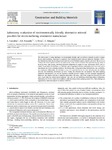Laboratory evaluation of environmentally friendly alternative mineral powders for micro-surfacing treatments manufacture

Use este enlace para citar
http://hdl.handle.net/2183/34114
A non ser que se indique outra cousa, a licenza do ítem descríbese como Atribución-NoComercial-SinDerivadas 3.0 España
Coleccións
- Investigación (ETSECCP) [826]
Metadatos
Mostrar o rexistro completo do ítemTítulo
Laboratory evaluation of environmentally friendly alternative mineral powders for micro-surfacing treatments manufactureData
2023Cita bibliográfica
Corraliza, S., Pasandín, A. R., Pérez, I., Delgado, C. (2023). Laboratory evaluation of environmentally friendly alternative mineral powders for micro-surfacing treatments manufacture. Construction and Building Materials, 400, 132683. https://doi.org/10.1016/j.conbuildmat.2023.132683
Resumo
[Abstract:] The effectiveness of using alternative environmentally friendly and cost-effective mineral powders to manufacture micro-surfacing treatments is examined. Four mineral powders (calcium carbonate, dolomite, PAVAL, and mineral dust from the recycling of used toner) as well as Portland cement (control) were used. The use of two of them, the PAVAL and the toner, is the main novelty of the present research. Their granulometry by means of an air jet sieve, their density, and their chemical composition by means of X-ray fluorescence (XRF) were obtained. To generalise the findings, two different types of aggregate (siliceous and porphyritic) have been used to manufacture the micro-surfacing treatment. The mixing time, setting and curing characteristics, and workability were analyzed. Additionally, the resistance to the loss of particles by the wet track abrasion was also studied. Likewise, the consistency assessment was done. Finally, the cohesion also was attained. The micro-surfacing treatments manufactured with all the alternative mineral powders comply with the technical requirements. Moreover, they improve the loss of particles, particularly the toner, with a loss of particles between 87% and 280% lower than the control micro-surfacing. Also, they are less hardening-controlling additive demanding. Particularly the PAVAL needs 0.2% of additive while the control micro-surfacing needs 0.6%. These findings are supported by statistical analysis of variance (ANOVA).
Palabras chave
Micro-surfacing treatments
PAVAL
Toner
Calcium carbonate
Dolomite
Mineral powder
PAVAL
Toner
Calcium carbonate
Dolomite
Mineral powder
Descrición
The authors would like to thank Blas García for his assistance in carrying out the tests, particularly for his contribution in selecting the most appropriate parameters, based on his extensive experience. The job would have been much more difficult without him. They would also like gratefully aknowledge Ecoasfalt, S.A. for providing the bitumen emulsion, aggregates, and some fillers (cement, dolomite and calcium carbonate). They also would like to thank Química de los Pavimentos for providing the hardening-controlling additive, Befesa for providing the Paval, and Waste zero Wold S.L. for providing the waste toner.
Versión do editor
Dereitos
Atribución-NoComercial-SinDerivadas 3.0 España






